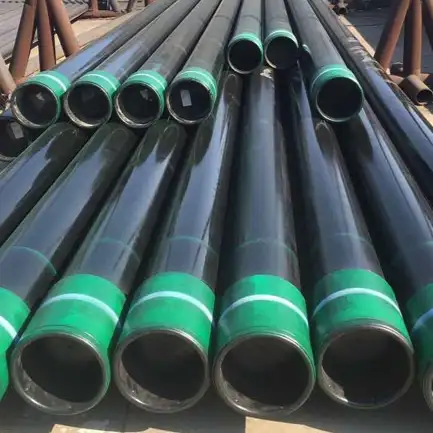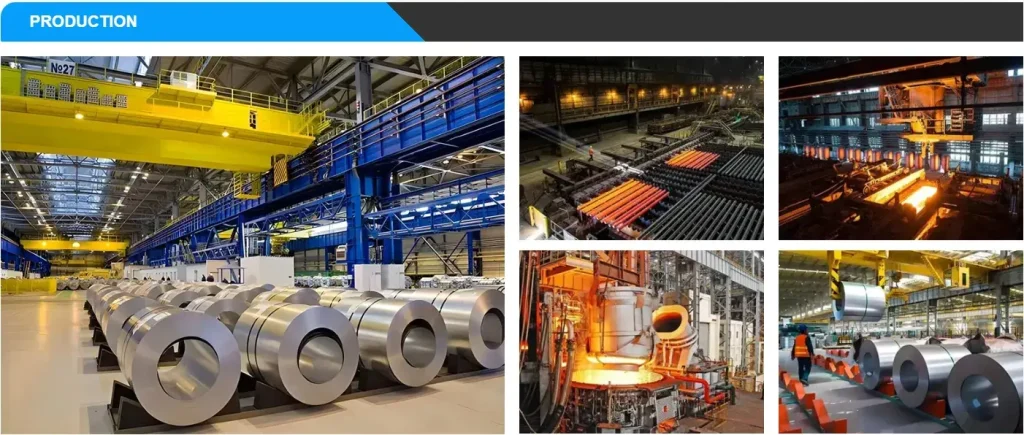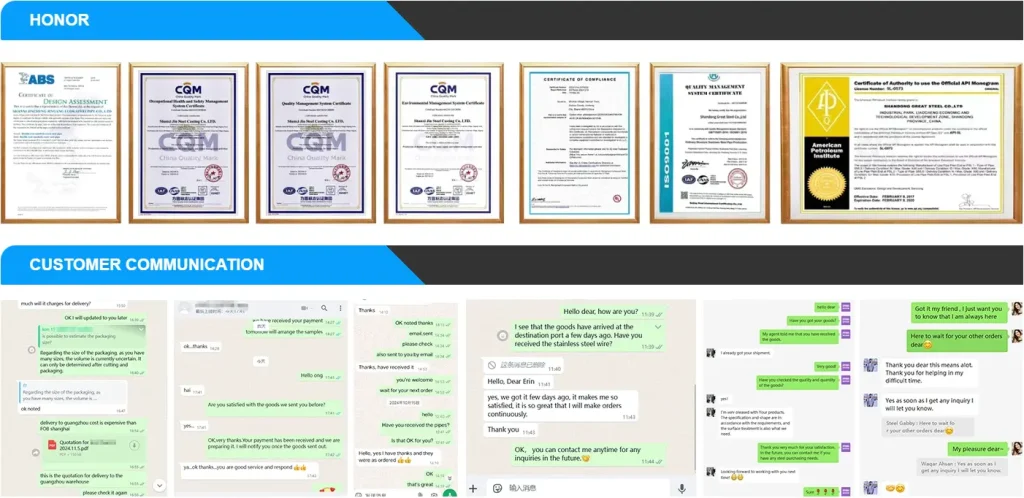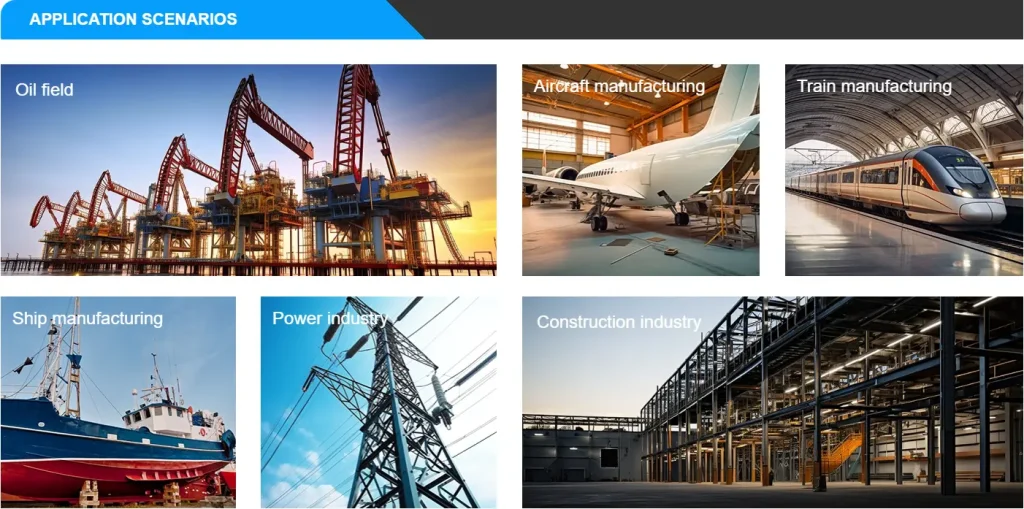L80 grade pipe, known for its controlled yield strength, is a premium choice designed to withstand corrosive environments and specific well conditions where its properties are essential for integrity and safety. At Luokaiwei, We can assure you that we offer 100% factory prices and support custom services for API 5CT L80 casing and tubing, ensuring you get meticulously manufactured products that meet the most stringent industry standards without unnecessary markups.
What is API 5CT L80 Casing and Tubing Pipe?
In the challenging environment of oil and gas wells, every component plays a crucial role in ensuring safety, efficiency, and longevity. API 5CT is the fundamental specification from the American Petroleum Institute that governs seamless and welded casing and tubing pipes for the petroleum and natural gas industries. It sets rigorous standards for manufacturing processes, material properties, dimensions, and testing.
Within this specification, L80 refers to a specific steel grade defined by its minimum yield strength of 80,000 pounds per square inch (psi). This controlled yield strength is a key characteristic that positions L80 as a specialized material. Unlike some other grades, L80 is typically used in wells that encounter corrosive environments, particularly those containing hydrogen sulfide (H2S), a highly corrosive gas often found in “sour” wells. The metallurgical composition and heat treatment for L80 are carefully managed to provide enhanced resistance to Sulfide Stress Cracking (SSC), a major concern in sour service applications.
As a metal materials expert, I often emphasize that L80 isn’t just about strength; it’s about controlled strength with specific anti-corrosion properties. This makes it an indispensable choice for operators looking for reliability in demanding well conditions, ensuring the integrity of the wellbore and the safe flow of hydrocarbons.
Why L80 Grade Matters: Applications and Advantages
The specific properties of API 5CT L80 pipe make it uniquely suited for particular applications in the oil and gas sector.
Primary Applications:
- Sour Service Wells: This is the most significant application. L80 is specifically designed for wells where hydrogen sulfide (H2S) is present. H2S can lead to Sulfide Stress Cracking (SSC) in susceptible steels, causing catastrophic failures. L80’s controlled chemistry and heat treatment minimize this risk.
- Medium-Depth to Deep Wells: Its strength-to-weight ratio makes it suitable for various depths, handling the stresses encountered without being overly heavy or difficult to handle.
- Casing String: Used to line the wellbore, providing structural integrity and preventing collapse. L80 casing ensures the well remains stable in corrosive formations.
- Tubing String: The conduit through which oil or gas flows from the reservoir to the surface. L80 tubing is vital for safely transporting corrosive fluids.
- Geothermal Wells: Environments with high temperatures and often corrosive brines benefit from L80’s robust properties.
Key Advantages of L80 Pipe:
- Sulfide Stress Cracking (SSC) Resistance: This is its hallmark advantage. Compared to higher strength grades like P110, L80’s lower hardness and optimized microstructure significantly improve its resistance to SSC, which is critical for sour gas environments.
- Controlled Yield Strength: The precise 80 ksi yield strength offers a balance of strength and ductility, preventing premature failure under stress while still allowing for some deformation without fracturing.
- Cost-Effectiveness for Sour Service: While often more expensive than lower grades like J55 or K55, L80 provides a significantly more economical solution than specialized corrosion-resistant alloys (CRAs) for moderately sour conditions, offering a sweet spot in the material selection matrix.
- Reliability and Safety: Its adherence to strict API 5CT standards ensures a high level of quality control, contributing to safer well operations and reduced risk of environmental incidents.
- Good Weldability and Formability: While still high strength, L80 generally offers better weldability and formability compared to ultra-high strength grades, which can be advantageous during installation and repair.
From Luokaiwei’s perspective, providing L80 pipe means delivering confidence to our clients in some of the most challenging operating environments. It’s a product where precision and compliance are absolutely non-negotiable.
API 5CT L80 Casing and Tubing Pipe: Specifications and Properties
Understanding the numbers behind the name is crucial for engineers and procurement specialists. Here’s a breakdown of the key specifications and typical properties.
Chemical Composition (Typical, not exhaustive; specific ranges defined by API 5CT)
The precise chemical composition is carefully controlled to achieve the desired mechanical properties and SSC resistance. Values are generally maximum percentages unless otherwise specified.
| Element | Typical Composition (%) | Role |
| Carbon (C) | 0.28 – 0.40 | Influences hardness and strength. |
| Manganese (Mn) | 0.60 – 1.20 | Increases strength and hardenability. |
| Silicon (Si) | 0.17 – 0.37 | Deoxidizer, strengthens steel. |
| Sulfur (S) | le 0.005 | Kept very low to improve SSC resistance. |
| Phosphorus (P) | le 0.010 | Kept very low to improve SSC resistance and toughness. |
| Chromium (Cr) | 0.50 – 1.00 | Enhances hardenability, strength, and corrosion resistance. |
| Molybdenum (Mo) | 0.15 – 0.25 | Increases strength, toughness, and SSC resistance. |
| Vanadium (V) | le 0.10 | Improves strength and fine grain structure. |
| Nickel (Ni) | le 0.20 | Often controlled for SSC resistance. |
| Copper (Cu) | le 0.20 | Often controlled for SSC resistance. |
Note: Specific ranges are detailed in API 5CT for L80-1 and L80-13Cr, with tight controls on impurities like S and P to ensure SSC resistance.
Mechanical Properties (API 5CT Q1 Level)
These values are critical for structural integrity and performance in the wellbore.
| Property | Minimum Value (L80) | Maximum Value (L80) | Unit |
| Yield Strength | 80,000 | 95,000 | psi |
| Tensile Strength | 95,000 | N/A (typically 100,000+) | psi |
| Elongation (on 2 inches) | As per API 5CT annex | N/A | % |
| Hardness (HRC) | N/A | 23 | HRC (Rockwell C Scale) |
Note: The maximum hardness limit of 23 HRC is particularly crucial for L80, as higher hardness significantly increases susceptibility to Sulfide Stress Cracking (SSC). API 5CT also defines two types of L80: L80 Type 1 (general purpose) and L80 13Cr (with 13% Chromium for enhanced corrosion resistance in specific applications), each with slightly nuanced properties.
Common Specification Parameters
When ordering, these are the key dimensions and types:
| Parameter | Description | Common Values |
| Outer Diameter (OD) | External diameter of the pipe. | 4 1/2″ to 13 3/8″ for casing; 2 3/8″ to 4 1/2″ for tubing |
| Wall Thickness | Thickness of the pipe wall (determines weight/foot). | Varies by OD and weight series |
| Weight per Foot | Unit weight (determines pipe strength and handling). | E.g., 9.5 lb/ft for 4 1/2″ casing; 6.5 lb/ft for 2 7/8″ tubing |
| Length | Standard lengths of pipe joints. | Range 1 (R1): 20-24 ft; Range 2 (R2): 28-32 ft; Range 3 (R3): 38-42 ft |
| End Finish | Type of connection at the pipe ends. | BTC (Buttress Threaded and Coupled), LTC (Long Threaded and Coupled), STC (Short Threaded and Coupled), Premium Connections |
| Manufacturing Process | How the pipe is made. | Seamless (SML) or Electric Resistance Welded (ERW) |
As a supplier from Luokaiwei, we meticulously control these parameters, performing rigorous tests to ensure every joint of L80 pipe meets or exceeds API 5CT requirements.
Manufacturing Process: From Steel to Pipe
The production of API 5CT L80 casing and tubing pipe is a highly controlled and sophisticated process, ensuring the material meets its stringent performance criteria, especially for SSC resistance. At Luokaiwei, our manufacturing adheres to the highest standards.
- Steelmaking (Electric Arc Furnace or Basic Oxygen Furnace): High-quality steel is produced, with precise control over the chemical composition. Impurities like Sulfur (S) and Phosphorus (P) are kept exceptionally low, which is crucial for SSC resistance in L80.
- Continuous Casting: The molten steel is cast into billets (for seamless pipe) or slabs (for welded pipe).
- Seamless Pipe Production (Mandrel Mill or Extrusion): For seamless pipe, hot billets are pierced and then rolled over a mandrel to form a hollow tube. This process ensures uniform wall thickness and excellent structural integrity. This is the preferred method for high-strength OCTG.
- Welded Pipe Production (ERW): For Electric Resistance Welded (ERW) pipe, steel strips are continuously formed into a tube and then welded longitudinally using high-frequency current. While acceptable for some API grades, seamless is generally preferred for L80 and higher grades due to the demanding service conditions.
- Heat Treatment (Quenching and Tempering): This is a critical step for L80. The pipe is first heated to a high temperature (austenitizing), then rapidly cooled (quenched) to achieve a martensitic microstructure. Subsequently, it’s reheated to a lower temperature (tempered) to achieve the desired balance of strength, hardness, and toughness, and critically, to reduce residual stresses that contribute to SSC. The tempering temperature is meticulously controlled to ensure the hardness stays below the critical 23 HRC limit.
- Straightening: Pipes are straightened to meet dimensional tolerances.
- Non-Destructive Testing (NDT): A range of NDT methods are employed, including ultrasonic testing (UT), eddy current testing (ECT), and magnetic particle inspection (MPI), to detect any internal or surface flaws.
- Hydrostatic Testing: Each pipe is subjected to high internal pressure to verify its leak integrity.
- End Finishing: Threads (BTC, LTC, STC, or premium connections) are precisely cut or rolled onto the pipe ends, and couplings are applied.
- Inspection and Certification: Final visual, dimensional, and mechanical property inspections are carried out. Mill Test Certificates (MTCs) are generated, confirming adherence to all API 5CT requirements, including traceability.
This rigorous manufacturing process, especially the stringent control over heat treatment and impurity levels, is why L80 pipe is a premium product in the OCTG market.
Comparison with Other API 5CT Grades
To truly appreciate L80, it helps to see how it fits within the broader API 5CT landscape, particularly concerning its application for sour service.
| Grade | Yield Strength (psi) | Tensile Strength (psi) | Typical Hardness (HRC) | Primary Application | SSC Resistance | Cost (Relative) |
| J55 | 55,000 – 80,000 | 75,000 | le 23 | General purpose, shallow wells | Low | Low |
| K55 | 55,000 – 80,000 | 95,000 | le 23 | Similar to J55, higher tensile | Low | Low |
| N80 | 80,000 – 110,000 | 100,000 | le 23 | General purpose, medium depth wells | Generally considered for sweet service | Medium |
| L80 | 80,000 – 95,000 | 95,000 | le 23 (Critical) | Sour service, corrosive wells | Excellent | Medium-High |
| C95 | 95,000 – 110,000 | 100,000 | le 25.5 | Sour service, higher strength than L80 | Good, but more susceptible than L80 | High |
| P110 | 110,000 – 140,000 | 125,000 | le 28 | Deep, high-pressure wells | Low (highly susceptible to SSC) | High |
| Q125 | 125,000 – 150,000 | 135,000 | le 30 | Ultra-deep, high-pressure wells | Very Low (highly susceptible to SSC) | Very High |
Note: N80 can sometimes be encountered as “N80Q” (quenched and tempered, similar processing to L80 but without the same strict SSC controls) or “N80-1” (normalized). However, N80 (even N80Q) does not have the same guaranteed SSC resistance as L80, due to differences in chemical composition limits and explicit testing requirements for L80.
My takeaway from this comparison is clear: L80 occupies a unique and crucial position. It’s strong enough for many demanding well conditions but specifically engineered to mitigate the severe threat of SSC, a property that higher strength grades like P110 lack and lower grades like J55/K55 don’t need due to their applications. This makes L80 a highly cost-effective and safe choice for sour environments where full CRAs would be prohibitively expensive.
Global Market Price Comparison for API 5CT L80 Casing and Tubing Pipe
The price of API 5CT L80 casing and tubing pipe is influenced by global steel prices, oil and gas market activity, regional demand, manufacturing costs, and the specific supplier’s scale. The figures below are illustrative estimates per metric ton (MT), as of mid-2025, for seamless L80 pipe in standard sizes and lengths (e.g., 7″ OD, 26 lb/ft casing, R3 length, or 2 7/8″ OD, 6.5 lb/ft tubing, R2 length). Actual prices will vary with diameter, wall thickness, length, end connections, and order volume.
| Region/Source | Estimated Price Range (USD per MT) | Key Price Drivers |
| China / Southeast Asia | $1,100 – $1,600 | Large production capacity, competitive labor costs, raw material import costs. |
| Europe | $1,600 – $2,200 | High manufacturing standards, elevated energy costs, environmental regulations. |
| North America (USA) | $1,800 – $2,500 | High labor costs, domestic energy prices, potential tariffs on imported steel. |
| Middle East | $1,300 – $1,900 | Growing local production, proximity to major oil & gas fields, import reliance. |
| South America | $1,400 – $2,000 | Varied production capabilities, internal demand, logistics. |
Disclaimer: These are approximate market prices for general budgeting. Actual purchase prices from Luokaiwei or other suppliers will be based on specific quotes, order quantities, delivery terms (FOB, CIF, etc.), and prevailing market conditions at the time of negotiation.
When considering procurement, companies like Luokaiwei, with direct factory operations, can often provide pricing at the lower end of these ranges or even below, especially for large-scale projects, due to our streamlined cost structure and bulk material purchasing power.
Saudi Arabian Procurement Case Study: L80 for Sour Gas Development
I was directly involved in a fascinating project concerning a major oil and gas operator in Saudi Arabia. This operator was developing a new series of deep, highly corrosive sour gas wells. The presence of significant H2S concentrations meant that standard API grades like P110 were out of the question due to their high susceptibility to Sulfide Stress Cracking. Corrosion-resistant alloys (CRAs) were an option but came with an exorbitant price tag, potentially making the project economically unfeasible.
The Solution: After extensive technical discussions and material selection analysis, we recommended and supplied API 5CT L80 Type 1 casing and tubing from Luokaiwei. The specific requirements included large volumes of 7″ OD, 26 lb/ft L80 casing in R3 length, and 3 1/2″ OD, 9.2 lb/ft L80 tubing in R2 length, all with premium connections for enhanced sealing integrity in high-pressure environments.
Why Luokaiwei was chosen:
- Guaranteed SSC Resistance: Our L80 pipes underwent stringent SSC testing as per NACE MR0175/ISO 15156 standards (Sour Service – Petroleum and natural gas industries), providing the client with absolute confidence in the material’s performance in their H2S-rich wells.
- Factory-Direct Pricing: For a project of this scale, the cost savings offered by Luokaiwei’s 100% factory pricing model were substantial, significantly reducing the overall well construction cost compared to sourcing from distributors or other premium manufacturers. This was crucial for project economics.
- Customization and Premium Connections: We could seamlessly integrate the client’s specific requirements for premium threaded connections directly into our manufacturing process, ensuring perfect compatibility and reducing field installation time.
- Reliable Logistics and Documentation: Our team managed the complex logistics to ensure timely delivery to the port of Dammam, providing comprehensive Mill Test Certificates and all necessary Saudi Aramco and international certifications.
Outcome: The Luokaiwei L80 casing and tubing performed flawlessly during installation and subsequent well operations. The client achieved the required well integrity in highly corrosive conditions at a significantly lower material cost than if they had opted for CRAs. This project underscored L80’s critical role as a robust, cost-effective solution for sour service, and highlighted Luokaiwei’s capability to deliver high-quality, specialized OCTG solutions for major international operators.
Important Standards and Technical Requirements
When specifying or procuring API 5CT L80 Casing and Tubing Pipe, adherence to specific industry standards is paramount for safety and performance. I cannot overstate the importance of verifying compliance with these key documents:
- API Specification 5CT – Specification for Casing and Tubing: This is the foundational standard. It details the manufacturing process, chemical composition, mechanical properties, dimensions, testing methods, and inspection requirements for various grades of casing and tubing, including L80. It’s periodically updated, so ensuring compliance with the latest edition is crucial.
- API RP 5C1 – Recommended Practice for Care and Use of Casing and Tubing: While not a manufacturing standard, this provides essential guidelines for handling, transportation, storage, and running of casing and tubing, directly impacting the longevity and performance of L80 pipe.
- NACE MR0175 / ISO 15156 – Petroleum and natural gas industries — Materials for use in H2S-containing environments in oil and gas production: This international standard is absolutely critical for L80 and any material used in sour service. It specifies the requirements for metallic materials to resist Sulfide Stress Cracking (SSC) in H2S environments, including specific hardness limits (like 23 HRC for L80) and test methods. Compliance with NACE MR0175/ISO 15156 is the core reason L80 is chosen for sour wells.
- ASTM A370 – Standard Test Methods and Definitions for Mechanical Testing of Steel Products: This general ASTM standard is referenced by API 5CT for specific mechanical testing procedures, such as tensile testing to determine yield and tensile strength, and hardness testing.
- ISO 9001 – Quality Management Systems: While not specific to pipe, a manufacturer’s adherence to ISO 9001 indicates a robust quality management system, ensuring consistency in production, testing, and traceability, which is vital for critical components like OCTG. Luokaiwei’s processes are ISO 9001 certified.
Always insist on Mill Test Certificates (MTCs) from your supplier. These documents provide verifiable proof that the pipe you receive meets all the specified requirements of API 5CT and NACE MR0175/ISO 15156, including detailed chemical composition, mechanical properties, and heat treatment data for that specific batch of material.
Frequently Asked Questions (FAQs)
1. What is the main difference between L80 Type 1 and L80 13Cr?
L80 Type 1 is a low-alloy carbon steel, specifically designed with controlled chemistry and heat treatment to resist Sulfide Stress Cracking (SSC) in H2S environments, primarily through its controlled hardness (le23 HRC) and strict limits on impurities. L80 13Cr is a martensitic stainless steel (containing approximately 13% Chromium). While also having an L80 strength grade, its high chromium content provides significantly enhanced general corrosion resistance (e.g., against CO2 and chlorides) in addition to SSC resistance, making it suitable for more aggressive or complex corrosive environments. L80 13Cr is considerably more expensive than L80 Type 1.
2. Can L80 pipe be used in sweet (non-H2S) service wells?
Yes, absolutely. While L80 is specifically engineered for sour service, its controlled strength and quality make it perfectly suitable for sweet (non-H2S) service wells as well. However, if H2S is definitively absent, other, often less expensive, API grades like N80 (or even P110 if high strength is the only criterion) might be chosen as more economically viable alternatives, as they don’t carry the added cost associated with L80’s SSC-resistant properties.
3. What is Sulfide Stress Cracking (SSC) and why is L80 resistant to it?
Sulfide Stress Cracking (SSC) is a brittle fracture mechanism that occurs in susceptible metallic materials when exposed to a corrosive environment containing hydrogen sulfide (H2S), in combination with tensile stress. H2S can lead to the absorption of hydrogen into the steel, which embrittles the material and causes cracking. L80 is resistant because its specific chemical composition (low sulfur and phosphorus), controlled microstructure (through precise quenching and tempering), and critically, its controlled maximum hardness (le23 HRC), make it less susceptible to hydrogen embrittlement compared to higher strength, harder steels.
4. How do premium connections compare to standard API threads for L80 pipe?
Standard API threads (like BTC, LTC, STC) are common and cost-effective. However, premium connections offer superior sealing integrity, improved tensile and compression strength, and better resistance to galling, especially in challenging downhole conditions involving high pressures, high temperatures, or corrosive fluids. For critical wells, particularly sour service applications where leaks could be catastrophic, operators often prefer premium connections for their enhanced reliability, even though they add to the overall pipe cost.
5. What information do I need to provide when requesting a quote for L80 pipe?
To get an accurate quote, you should provide the following key details: Quantity (number of joints or tons), Outer Diameter (OD), Wall Thickness or Weight per foot, Length Range (R1, R2, or R3), End Finish (e.g., BTC, LTC, Premium Connection type), Manufacturing Process (Seamless or ERW, though seamless is highly recommended for L80), and specify API 5CT L80 Type 1 or L80 13Cr depending on your corrosive environment. Any additional testing requirements (e.g., specific NACE testing) should also be noted.
In conclusion, API 5CT L80 Casing and Tubing Pipe represents a vital intersection of strength, durability, and specialized corrosion resistance essential for the demands of the oil and gas industry, especially in sour service environments. Its precise metallurgical properties and stringent manufacturing standards set it apart. As your partner at Luokaiwei, we are committed to providing L80 pipe that meets these exacting requirements at 100% factory prices, supported by our comprehensive customization services, ensuring your well projects are built with unparalleled integrity and efficiency.







